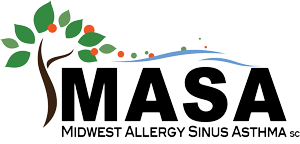MASA Recognizes National Penicillin Allergy Day
Midwest Allergy Sinus Asthma, SC Observes National Penicillin Allergy Day
On September 28th, MASA joins key initiative to educate the public on penicillin allergy and testing…
Midwest Allergy Sinus Asthma, SC is participating in the second annual National Penicillin Allergy Day, a national awareness day to help educate the healthcare community, and the broader U.S. public, on penicillin allergy and the critical importance of testing for this allergy. This date has maintained its significance as the day Alexander Fleming discovered penicillin, the world’s first antibiotic, ninety years ago.
By observing National Penicillin Allergy Day, MASA is hoping to shine a light onto the importance of assessing penicillin allergy and the potential impact it can have on patients. Studies have shown nine out of ten patients reporting a penicillin allergy are not truly allergic[1]. Those who are falsely labeled with the allergy could be affected by higher medical costs, increased risk of antibiotic resistance, and longer lengths of hospital stays. A healthcare provider trained in penicillin allergy assessment, such as us, can discuss the risks and benefits of testing.
Over the past few years, health organizations such as the Center of Disease Control and Prevention (CDC), Infectious Disease Society of America (IDSA) and The American Academy of Allergy, Asthma & Immunology have increased their support for more widespread and routine performance of penicillin skin testing for patients with a history of allergy to penicillin or other beta lactams (e.g., ampicillin or amoxicillin).
A negative result is often surprising to patients because many have been told their entire lives by parents and medical professionals that they’re allergic. Penicillin has the potential of being ‘out grown’ when diagnosed as a child, which makes penicillin allergy testing as an adult very important. Once a patient is de-labeled from their penicillin allergy, their provider is able to potentially prescribe more effective and cost-efficient antibiotics.
- Macy, E., & Contreras, R. (2014). Health care use and serious infection prevalence associated with penicillin “allergy” in hospitalized patients: a cohort study.Journal of Allergy and Clinical Immunology,133(3), 790-796.



